Some camps dotted in the forest have a few dozen people, some more than 1,000. The displaced people sleep packed together under plastic sheeting for protection from monsoon rains.
Food is short and there are signs of disease spreading, said people who have fled recent fighting in eastern Myanmar’s Kayah state, just one of several conflicts to surge since the Feb. 1 coup toppled elected leader Aung San Suu Kyi.
“Some children are suffering diarrhea. It is difficult to get clean water here. Some people didn’t get a chance to bring rice or food,” said 26-year-old Foung, who gave only one name for fear of retribution.

Photo: AFP
“We pray,” he said, sharing pictures of a tarpaulin slung between boulders under the trees where he now sleeps.
The UN has estimated that nearly 110,000 people have been displaced in Kayah by the violence.
With new fighting in northern and western Myanmar, nearly 200,000 people have fled homes elsewhere since the coup, by far the biggest mass movement since the 2017 exodus of 700,000 Rohingya Muslims in the face of an army offensive.
The junta has branded its opponents as terrorists — including forces such as the newly formed Karenni National Defense Force, which has been fighting in the region since last month, initially inflicting casualties on the army.
Although the Karenni said that it would halt attacks after appeals from communities, many of those taking refuge in the forest show little sign of readiness to take the risk of heading back to their homes.
“Some people from remote villages went home to take bags of rice and stuff during the ceasefire period, but most do not dare to stay,” said John Canaydy, from a village near the town of Demoso, center of much of the fighting.
“Staying in the camp is safer than staying in our own homes,” said Canaydy, who is on a wanted list for taking part in protests.
In a bulletin on Tuesday, the UN Office for the Coordination of Humanitarian Affairs said that aid efforts by national and international groups to complement the work of local communities had not been sufficient to address all needs.
“Efforts have been met with access challenges due to insecurity and roadblocks,” the office said.
Some people have tried to sneak into deserted towns and villages under cover of darkness to try to get food to bring back to the forest.
At least three volunteers had been killed by the junta’s forces when they tried to bring help, said Banya Khung Aung, director of the Karenni Human Rights Group.
“One-third of the population are now in the forest,” he said.

ELECTION DISTRACTION? When attention shifted away from the fight against the militants to politics, losses and setbacks in the battlefield increased, an analyst said Recent clashes in Somalia’s semi-autonomous Jubaland region are alarming experts, exposing cracks in the country’s federal system and creating an opening for militant group al-Shabaab to gain ground. Following years of conflict, Somalia is a loose federation of five semi-autonomous member states — Puntland, Jubaland, Galmudug, Hirshabelle and South West — that maintain often fractious relations with the central government in the capital, Mogadishu. However, ahead of elections next year, Somalia has sought to assert control over its member states, which security analysts said has created gaps for al-Shabaab infiltration. Last week, two Somalian soldiers were killed in clashes between pro-government forces and

Ten cheetah cubs held in captivity since birth and destined for international wildlife trade markets have been rescued in Somaliland, a breakaway region of Somalia. They were all in stable condition despite all of them having been undernourished and limping due to being tied in captivity for months, said Laurie Marker, founder of the Cheetah Conservation Fund, which is caring for the cubs. One eight-month-old cub was unable to walk after been tied up for six months, while a five-month-old was “very malnourished [a bag of bones], with sores all over her body and full of botfly maggots which are under the

BRUSHED OFF: An ambassador to Australia previously said that Beijing does not see a reason to apologize for its naval exercises and military maneuvers in international areas China set off alarm bells in New Zealand when it dispatched powerful warships on unprecedented missions in the South Pacific without explanation, military documents showed. Beijing has spent years expanding its reach in the southern Pacific Ocean, courting island nations with new hospitals, freshly paved roads and generous offers of climate aid. However, these diplomatic efforts have increasingly been accompanied by more overt displays of military power. Three Chinese warships sailed the Tasman Sea between Australia and New Zealand in February, the first time such a task group had been sighted in those waters. “We have never seen vessels with this capability

‘NO INTEGRITY’: The chief judge expressed concern over how the sentence would be perceived given that military detention is believed to be easier than civilian prison A military court yesterday sentenced a New Zealand soldier to two years’ detention for attempting to spy for a foreign power. The soldier, whose name has been suppressed, admitted to attempted espionage, accessing a computer system for a dishonest purpose and knowingly possessing an objectionable publication. He was ordered into military detention at Burnham Military Camp near Christchurch and would be dismissed from the New Zealand Defence Force at the end of his sentence. His admission and its acceptance by the court marked the first spying conviction in New Zealand’s history. The soldier would be paid at half his previous rate until his dismissal